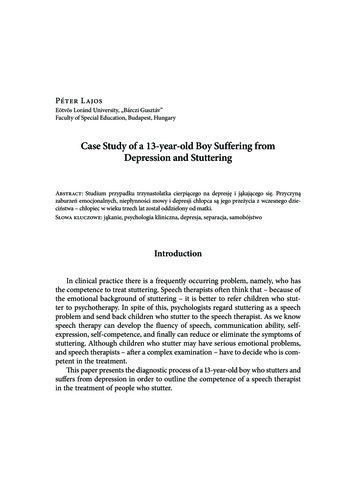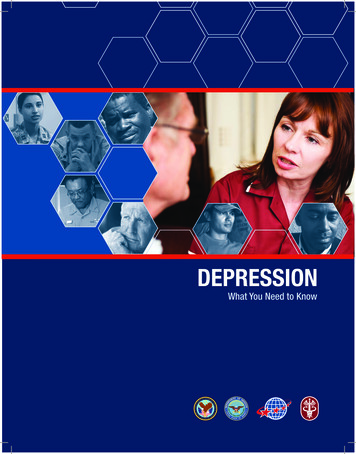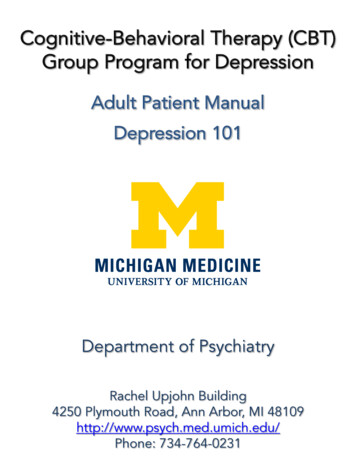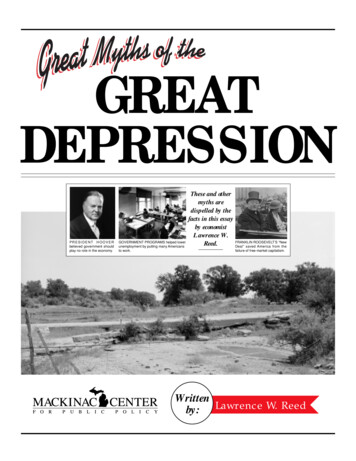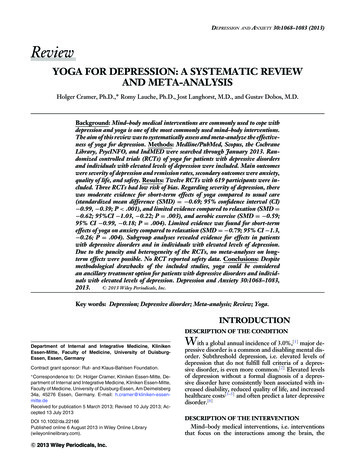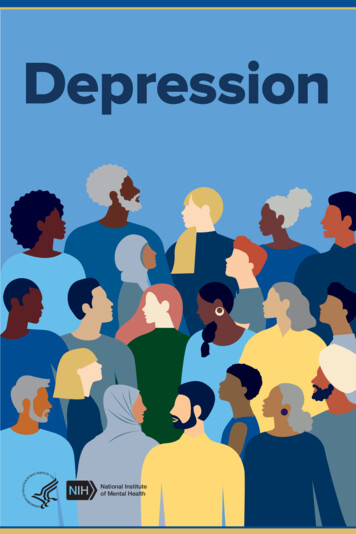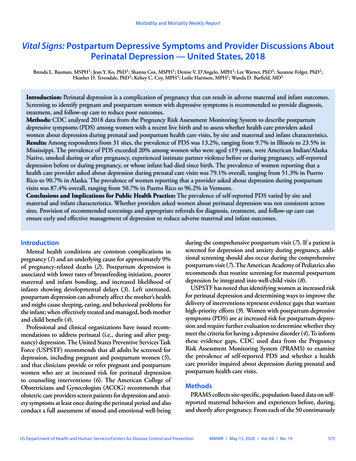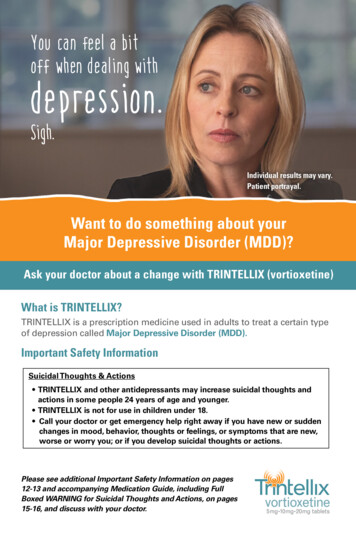
Transcription
224 Taiwanese Journal of Psychiatry (Taipei) Vol. 25 No. 4 2011OverviewDealing with Depression: A Christian PerspectiveHsin-Nan Lin, M.D., M.A.Objective: Depression is a bio-psycho-socio-spiritual disorder. Depressioninevitably forces people to face experiences of meaninglessness and hopelessness.In this overview, I intended to review Christian’s aspect of spiritual care on depression, restoring meaning, purpose and hope for the depressed person. Method:Based on my practice of Christianity and psychiatry, I searched the literature onthe topic area. Results: I first describe depressive feeling in those with Christianfaith, and explained the importance of restoring the meaning in Christianity. Then,I deal with depression with eight aspects: (A) Jesus: a man of sorrow and acquainted with grief, (B) prayer: God as therapist, (C) Christian fellowship: a strong socialsupport, (D) suffering: a blessing in disguise, (E) hope: enabling courage to live,(F) forgiveness: healing of trauma, (G) letting go: overcoming loss, and (H) love:overcoming learned helplessness. Conclusion: By adding Christian spiritual careto ordinary psychiatric treatments, Christians suffering with depression can get aholistic treatment for their depression.Key words: Christian, spiritual care, meaning, hope(Taiwanese Journal of Psychiatry [Taipei] 2011; 25: 224-32)IntroductionDepression is a serious mental disorder confronting an ever increasing number of persons inour contemporary society. It is so common thatdepression has been called the common cold ofmental illness. This is an unfortunate analogy because such assumption can underplay the devastating effect that depression has on individualsand their families. Depression affects people fromall backgrounds, and even those with greatChristian spiritual leaders such as Martin Lutherand Ignatius de Loyola [1].Being a bio-psycho-socio-spiritual disorder,depression needs a holistic treatment of all thesefour aspects. Depression inevitably forces peopleto face experiences of meaninglessness and hopelessness with devastating consequences.Depression can be as a silent killer as many sufferers feel ashamed of admitting their own problem.Many Christians feel that they cannot speak ofthis particular illness lest they be thought a “badChristian.” As a Christian, one should always seekout doctor’s advice when depression takes hold ofone’s life. During this time of spiritual darkness agood spiritual director is also vital [2, 3]. Thus, wecan consider depression as a profoundly spiritualDepartments of Psychiatry, College of Medicine and National Taiwan University Hospital, National Taiwan UniversityAddress correspondence to: Dr. Hsin-Nan Lin, Department of Psychiatry, National Taiwan University Hospital, No. 7, Chung SanSouth Road, Taipei 100, Taiwan
Lin HNillness, which can be helped through religious approach. In this paper, I would describe the feelingof depression in those with Christian faith, andstress the importance of restoring the meaning inChristianity before my focusing on the Christianaspects of spiritual care on depression.Feeling the Deepest Dark Pit ofDepression in Those withChristian FaithIn the depth of depression, you lose interestin everything around you including your family.The joy once you enjoyed for granted has all butdisappeared. You feel no sense of God’s presenceor that He is hearing your cries for help. You alsofeel that God keeps silent in spite of your desperate praying and crying, and that as if being falleninto a deepest dark pit.In a study of spirituality and depression,Swinton collected data using unstructured, indepth interviews on six subjects, who had eachexperienced depression for at least two years. Allparticipants were volunteers, committed to theChristian faith tradition and interested in spirituality. Eight central themes of spiritual significancewere emerged from the data of this study: (A) themeaningless abyss of depression; (B) questioningeverything; (C) abandonment by God and people;(D) clinging on through faith; (E) the desire to relate and the failure of relationship; (F) exhaustion,demoralization and feeling ground down; (G)trapped into living; and (H) the crucible of depression [4].In that dark abyss, you would easily doubtabout everything that previously gave life meaning and purpose. You will try to cling on something and desire to relate with outside world. Yetparadoxically, you doubt that such desire wouldwork. Social withdrawal and disconnecting from 225 God are common feelings among the depressed.They experience feelings of abandonment by Godand by those around them [5]. To take a true courage to wake up, those with depression will facethe darkness of another day. Although your bodyis alive, you feel that your soul is dead, and thatthe tired mind longs for sleeping forever but notwaking up. At this point of feeling being fallen inthe deepest pit, the depressed think that suicidemight become the first choice.The Importance of RestoringMeaning in ChristianityFrankl argues that the search for meaningand purpose are fundamental dynamic forces forthe development of mental health [6]. If life hasmeaning and purpose, then it is possible to copewith the considerable difficulties that depressionimposed on a person’s life. Spiritual faith in thecontext of organized religion can provide thechannel for restoring meaning, purpose and hopeto a person’s life through the power of liturgy andworship. Many get help from the Bible, particularly the Job and the Psalms of lament.Swinton pointed out in his study that “It isthe experience of relating to and identifying withfigures within scripture that provides him with thetemplate for making sense of his own situationand his current relationships with God, self andothers. The act of reading scripture is as much anemotional/relational experience as a cognitivelearning task [7].” In the experiences of Psalmistsand Job, the depressed find a similar doubts andquestions. Through the experience of relating toand identifying with the figures of the Bible, thedepressed find a resolution that involves in a return to God.
226 Spiritual Care of DepressionEight Christian Aspects ofSpiritual Care on depressionMany studies on spirituality and depressionhave confirmed positive effect of religious involvement in treating and preventing depression[8 -10]. Koenig et al. in a comprehensive overview of the topic to critically examine 100 studiesdealing with the association between religion andwell-being [11]. They reported that being religiousmight enhance a sense of hope that could possiblyinfluence rates of depression [11]. Koenig and hisDuke University research team members carriedout a study on depression and religion betweenNovember 1993 and March 1996. This is the first“prospective” investigation to examine the effectsof religiosity on speed of recovery from clinicallysignificant depressive disorder of men and womenover 60 years of age. They revealed that an activereligious life can both shield people from depression and reduce its toll in terms of physical health[12]. Dein in a review paper reported that “Theliterature suggests that those who are religioushave lower incidence of depressive symptoms/depression and that being religious may increasethe speed of recovery from depressive disorder[13].”Christian’s aspects of spiritual care on depression is aimed at restoring meaning, purposeand hope for the depressed. I will discuss them asfollowed:not from somewhere high above and distant, butrather a God stands close to them. Jesus Christ isthe God once became like a human being and hadexperienced depression himself.According to the descriptions of the HolyBible, the final days of Jesus in Jerusalem werefull of events and disasters. Just before Jesus wasarrested, he went with his disciples to a gardenGethsemane to pray. At that time Jesus began toshow grief and distress of mind and was deeplydepressed. The Bible describes it as in the following: “In great anguish, he prayed even more fervently; his sweat was like drops of blood falling tothe ground [15].” And on the cross just before hedied, Jesus cried out with a loud shout “My God,my God, why did you abandon me? [16]” Here wesee that Jesus’ depression was the same mental anguish, sorrow and dejection that we feel at times.“In his life on earth Jesus made his prayers and requests with loud cries and tears to God, who couldsave him from death [17].”Jesus cried and shed tears in the face of crises. Jesus felt troubled, forsaken and depressed inthe face of crises. Jesus released tension unashamedly through loud crying and shedding tears.Mohline et al. mentioned in their book that Jesusgave these “appropriate for the occasion” modelsof crying and shedding tears for Christians, menor women, to follow even in public [18]. Christianwith depression would be comforted and encouraged by the fact that their Lord Jesus had experienced the depression and defeated thedepression.Jesus: a man of sorrow and acquaintedwith griefPrayer: God as therapistFor the depressed person, “understanding” isthe most important thing they want in “spiritualcare” [14]. We know that those who could givemost effective care are those who had experiencedsuffering themselves. The depressed need a GodPrayer is a conversation and communicationwith God. Two core principles lay at the heart ofprayer: human freedom (intentionality) and human relating to the Divine (transcendence). Prayeris a relational experience. Prayer links the human
Lin HNrelating to God, and the freedom of human choiceor intentionality in that relating [19]. A depressedChristian can follow the way of Jesus by makingone’s prayers and requests with loud cries andtears to God. Once you start to pray, you are nolonger alone in this world. You have got a trustable one to hear your cries.Personally, I take prayer as a special form ofpsychotherapy. It is a 24-hour, free walk-in clinicand God is the therapist. To get benefit fromprayer, you have to practice prayer constantly before you get depressed. Otherwise, you could notpray when you were fallen in the deepest dark pitof depression [20].Christian fellowship: a strong socialsupportA network of supportive relationships is beneficial for the prevention and treatment of depression. Frequent religious involvement is associatedwith more extensive social support networks andmore extensive social support is consistentlyfound to be connected with a variety of positivephysical and psychological health outcomes.According to Larson’s 2003 report atAustralian 10th Annual Suicide PreventionNational Conference [21], persons who both participated in a religious group and highly valuedtheir religious faith are at a substantially reducedrisk of depressive disorder while people with noreligious link may raise their relative risk of majordepression by as much as 60%. Lack of organizational religious involvement is linked with a 20%60% increase in the odds of experiencing a majordepressive episode. Valuing one’s religious faithas centrally important and actively belonging to areligious group may give a spiritual basis formeaning and support from others, potentially giving hope and caring to protect against depression[22]. Among those who had been depressed at the 227 beginning of the study, those who have rankedtheir religious faith as highly important recoverfaster from their depression [23].Suffering: a blessing in disguiseChristians are familiar with verses from theHoly Bible: “We know that in all things Godworks for good with those who love him [24]”,and “We also boast of our troubles because weknow that trouble produces endurance, endurancebrings God’s approval, and approval creates hope[25].” Cardinal Bernardin pointed out in his bookThe Gift of Peace that for Christians, suffering isin communion with the Lord [26]. He stated in hisbook that in many ways Jesus Christ experiencedpain and suffering more deeply than Christianswill ever know. Yet in the face of it all, Jesus Christtransformed human suffering into somethinggreater: an ability to walk with the afflicted. AsChristians, you must first come to terms with suffering if you are to love as Jesus Christ loved. ForChristians, suffering is a gift and blessing fromGod in disguise. If you take suffering as a gift andblessing from God in disguise, you will look onsuffering as a friend rather than an enemy.Depression is a real suffering. Yet for those wholove God, depression is a stepping stone for spiritual growth. Depression still has its positive meaning. Through the experience of depression, youwould become more sensitive and helpful to people who are suffering from depression. Such experience will become a blessing both to you yourselfand those who were depressed [27].Hope: enabling courage to liveDuring World War II, Frankl was a prisonerat a German concentration camp and Moltmann aprisoner at a British camp. Since World War II,Frankl has helped so many people through histheory and practice of “logotherapy” [28], while
228 Spiritual Care of DepressionMoltmann has influenced Christianity through his1967 book Theology of Hope [29].They both observed that their fellow prisoners who had hope could cope the best. Hope gaveprisoners-of-war courage to live, made them survive. As a leading proponent of the theology ofhope, Moltmann believes that God’s promise toact in the future is more important than the factthat he has acted in the past. What is implied bythis focus on the future, however, is not withdrawal from the world in the hope that better world willsomehow evolve, but active participation in theworld in order to aid in the coming of that betterworld. He proposes that Christian hope should bethe central motivating factor in the life and thoughtof the church and of each Christian. For Moltmann,the whole creation longs for the renewal by the“God of Hope.” Empowered by hope, theChristian’s response should therefore involve:mission of the church to all nations, the hunger forrighteousness in the world, and love for the truelife of the imperiled and impaired creation. Thishope can help people to have courage to live andexpectation for the coming of a better world.Forgiveness: healing of traumaJesus teaches His followers to pray by saying: “Forgive us the wrongs we have done, as weforgive the wrongs that others have done to us[30].” Jesus put his teaching into action even whenhe was being hanged on the cross by saying:“Forgive them, Father! They do not know whatthey are doing [31].” Forgiveness is an importantbut is also a hard lesson for Christian to learn.Forgiveness does not come easy for most of us.Our human instinct is seeking pleasure and avoiding suffering. Naturally we draw back in self-protection when we have been injured. For Christian,forgiveness is a choice we make through a decision of our will, motivated by obedience to Godand his command to forgive. Since forgivenessgoes against our nature, we must forgive by faith.Unforgiveness leads to retenting and withholding negative emotions, like anger, hatred andfeeling of revenge [32]. Unforgiveness is bound toset you becoming prisoner of anger and hurt. Onthe other hand, forgiveness leads to release ofthese negative emotions, and brings peacefulness,contentment and empathy [33].Forgiveness is a way of letting go of the anger and hurt and ultimately a way of improvingour health and immune system functioning [www.medscape.com/viewarticle/742198]. Those whohold on anger and hurt, tend to have poor health, aweakened immune system, and are prone to having chronic illness. This is due to a rise in the levelof stress hormone cortisol that suppresses the immune system. Forgiveness therapy involves inspeaking your truth and letting go of anger andhurt (in the absence of the person you are forgiving). You can speak your truth in a letter (withoutsending it) to the person you are seeking to forgive, or in a role-play setting. Forgiveness is theright thing to do for physical, social and spiritualreasons [34].Once you have truly forgiven, you will getthe above-mentioned benefit of forgiveness. Howwill you know that you have truly forgiven? CorrieTen Boom, a Christian woman who survived aNazi concentration camp during the holocaust,said: ” Forgiveness is to set a prisoner free, and torealize the prisoner was you epingchristmas.htm).” You will know the work of forgiveness iscomplete when you experience the freedom thatcomes as a result. You are the ones who suffermost when you choose not to forgive. When youforgive, The Lord sets your hearts free from theanger, bitterness, resentment, and hurt that previously imprisoned you.
Lin HNTrue forgiveness is a slow process. Jesus’disciple Peter once came to Jesus and asked,“Lord, if my brother keeps on sinning against me,how many times do I have to forgive him? Seventimes?” “No, not seven times,” answered Jesus,“but seventy times seven [35].” It means that youhave to practice it repeatedly until your heart feelsfree from the anger, bitterness, resentment, andhurt.Letting go: overcoming lossGrief and depression are two related but different responses that are frequently confused eachother. Grief is the body’s normal response to aloss. After experiencing a major loss, many peopleexperience an intense emotional and physical response which may come in waves and is not present all the time. Most people can adjust to thedeath or loss. With time, the grieving person learnsto adjust to their life that has been changed by thedeath or loss. When the normal grief responsedoes not improve within four weeks of the loss, orthe symptoms get worse, present nearly every dayand persist for the majority of the day, it shouldraise the concern that the person may be developing a clinical depression.The Bible teaches that “Each one, as a goodmanager of God’s different gifts, must use for thegood of others the special gift he has receivedfrom God [36].” For a Christian, it implies thatyou are just a manager of God in this world butnot the owner of what you have. When facing theloss, you consider it as returning what you havebeen trusted to your Master. So we read from Job,that after his children and wealth are destroyedwithin one day, Job got up and tore his clothes ingrief. He shaved his head and threw himself facedownward on the ground. He said, “I was bornwith nothing, and I will die with nothing. TheLord gave, and now he has taken away [37].” 229 After experiencing such a major loss, Job didmanifest severe emotional and physical symptomswhich were quite like those experiences of depression. Job argued with his friends and God for whathappened on him. Through the process of hisquest, Job was healed and got over the depression.This sort of Christian faith helps one to cope withthe major loss by letting go. Such attitude reducesthe risk of developing into complicated grief (aclinical depression). For the Christian, owningnothing do not mean that you have nothing. Jesustold his follower that, “If any of you want to comewith me, you must forget yourself, carry yourcross, and follow me [38].” And he also said,“Foxes have holes, and birds have nests, but theSon of Man has no place to lie down and rest[39].” Mother Teresa’s worked at Calcutta andwitnessed “God uses nothingness to show hisgreatness [40].”Love: overcoming learned helplessnessA learned helplessness is a condition where aperson has learned to act helpless [41]. This motivational problem causes an individual who hasfailed over and over in the past to believe that he/she cannot do better. This feeling of inadequacyand perceived loss of control can lead to depression. A common feeling that accompanies depression is that of being trapped in an intolerable situation. The depressed person can often see twoalternatives, but neither of which is possible, andwithout change the existing situation is too painful. All often, this feeling leads to suicide as thedepressed person feels that their situation is insoluble by themselves or others. Christians suffer depression will also experience this intolerable situation. But Christians believe that God is love. Godlooks after everyone and cherishes even the smallest and weakest one. As the Bible says, “For whenwe were still helpless, Christ died for the wicked
230 Spiritual Care of Depressionat the time that God chose [42].” Even in thedepth of depression, the knowledge of Jesus oncelived in this world, experienced depression andovercame it, will encourage and give strength tothe believer.ConclusionBeing a bio-psycho-socio-spiritual disorder,depression needs a holistic treatment of all thesefour aspects. So far, psychiatric treatment on depression has focused on bio-psycho-social dimensions and spiritual intervention is relatively unexplored. For Christian suffering with depression,“understanding” is the most important thing theywant in terms of “spiritual care.” The depressedperson needs a God not from high above and distant, but rather a God stands close to them. ForChristian, Jesus Christ is the God once becamelike a human being and had experienced depression himself. Through prayer, social support fromChristian fellowship, taking suffering as a gift andblessing from God in disguise, hope that leads tocourage to live and expectation for the coming ofa better world, forgiveness that leads to healing oftrauma, letting go to overcome loss, and love toovercome learned helplessness, the depressedChristian can restore their meaning, purpose andhope in life.References:5. Swinton J: Spirituality and Mental Health Care:6.7.8.9.10.11.12.13.14.15.1. van Lieburg MJ: Famous Depressives: Ten HistoricalSketches. Rotterdam: Organon International, 1988.2. Rabior WE: Emerging from Depression. Liguori,MO: Liguori Publications, 2005.3. Hermes KJ: Surviving Depression: A CatholicApproach. Boston: Pauline Books & Media, 2003.4. Swinton J: Spirituality and Mental Health Care:Rediscovering a “Forgotten” Dimension. London:Jessica Kingsley Publishers, 2001: 112-24.16.17.Rediscovering a “Forgotten” Dimension. London:Jessica Kingsley Publishers, 2001: 120-1.Frankl VE: Man’s Search for Meaning: From DeathCamp to Existentialism. Boston: Beacon Press,1962.Swinton J: Spirituality and Mental Health Care:Rediscovering a “Forgotten” Dimension. London:Jessica Kingsley Publishers, 2001: 130-1.Koenig HG: Religion and remission of depression inmedical inpatients with heart failure/pulmonary disease. J Nerv Mental Dis 2007; 193: 389-95.McCullough ME, Larson DB: Religion and depression: a review of the literature. Twin Research. 1999;2: 126-36.Hall DP: Breaking through depression: Biblical andMedical Approach to Wholeness. Eugene, Oregon:Harvest House Publishers, 2009.Koenig HG, McCullough ME, Larson DB: Handbookof Religion and Health. Oxford: Oxford UniversityPress, 2001.Koenig HG: Religion offers protection from depression and helps those afflicted to recover quickly. In:Koenig HG, McConnell C, McConnell M (editors):The Healing Power of Faith: Science ExploresMedicine’s Last Great Frontier. New York: Simon &Schuster, 1999: 129-59.Dein S: Religion, Spirituality and depression:Implication for research and treatment. Prim CareComm Psychiatry. 2006; 11: 67-72.Swinton J: Spirituality and Mental Health Care:Rediscovering a “Forgotten” Dimension. London:Jessica Kingsley Publishers, 2001: 125-8.Holy Bible: The New Testament: Luke chapter 22verse 44. In: Today’s English Version/Today’s ChineseVersion (revised edition). Hong Kong: United BibleSocieties, 1995: 165.Holy Bible: The New Testament: Mark chapter 15verse 34. In: Today’s English Version/Today’s ChineseVersion (revised edition). Hong Kong: United BibleSocieties, 1995: 103.Holy Bible: The New Testament: Hebrew chapter 5verse 5. In: Today’s English Version/Today’s Chinese
Lin HN18.19.20.21.22.23.24.25.26.27.28.Version (revised edition). Hong Kong: United BibleSocieties, 1995: 415.Mohline D, Mohline J: Emotional Wholeness:Connecting with the Emotions of Jesus. Shippensburg,Pennsylvania, USA: Treasure House, 1997: 107-10.Delong WR: A Response to Larry Dossey: The Prayerof the Faithful: Prayer as a Metaphor for Medicineand Healing. In: Vande Creek L, ed. Scientific andPastoal Perspectives on Intercessory Prayer: AnExchange between Larry Dossey, M.D. and HealthCare Chaplains. New York: Harrington Park Press,1998: 63-71.Bernardin JL: The Gift of Peace: Personal Reflection.Chicago: Loyola Press, 1997: 67-8.Larson DB, Larson SS: Patient spirituality and mental health: a new focus in clinical care and research.Australian 10th Annual Suicide Prevention NationalConference, Brisbane, 2003.Strawbridge W, Cohen R, Shema S, Kaplan G:Frequent attendance at religious services and mortality over 28 years. Am J Pub Health 1997; 87:957-61.Braam AW, Beekman AFT, Deeg DHG, Smit JH,Tilburg W: Religiosity as a protective or prognosticfactor of depression in later life: results from a community study in Netherlands. Acta Psychiatr Scand1997; 96: 199-205.Holy Bible: The New Testament: Romans chapter 8verse 28. In: Today’s English Version/Today’s ChineseVersion (revised edition). Hong Kong: United BibleSocieties, 1995: 292-3.Holy Bible: The New Testament: Romans chapter 5verse 3-4. In: Today’s English Version/Today’sChinese Version (revised edition). Hong Kong:United Bible Societies, 1995: 287.Bernardin JL: The Gift of Peace: Personal Reflection.Chicago: Loyola Press, 1997: 45-9.Anderson NT, Baumchen H: Finding Hope Again:Overcoming Depression. Ontario, California, USA:Gospel Literature International, 1999.Frankl VE: Man’s Search for Meaning: AnIntroduction to Logotherapy. Boston: Beacon Press,2006. 231 29. Moltmann J: Theology of Hope: On The Ground and30.31.32.33.34.35.36.37.38.The Implications of a Christian Eschatology. London:SCM Press, 1967.Holy Bible: The New Testament: Matthew chapter 6verse 12. In: Today’s English Version/Today’s ChineseVersion (revised edition). Hong Kong: United BibleSocieties, 1995: 10.Holy Bible: The New Testament: Luke chapter 23verse 34. In: Today’s English Version/Today’s ChineseVersion (revised edition). Hong Kong: United BibleSocieties, 1995: 168.Newberg AB, d’Aquili EG, Newberg SK, deMariciV: The neuropsychological correlates of forgiveness.In: McCullough ME, Pargament KI, Thoresen CE,(editors): Forgiveness: Theory, Research, andPractice. New York: The Guilford Press, 2000:91-110.Thoresen CE, Luskin F, Harris AHS: Science andforgiveness interventions: reflections and recommendations. In: Worthington, Jr. EL (editor): Dimensionsof Forgiveness: Psychological Research andTheological Perspectives. Philadelphia: TempletonFoundation Press, 1998: 163-90.Barry MS: The Forgiveness Project: The StartlingDiscovery of How to Overcome Cancer, Find Healthand Achieve Peace. Grand Rapids, Michigan, USA:Kregel Publication, 2011.Holy Bible: The New Testament: Matthew chapter18 verse 21-22. In: Today’s English Version/Today’sChinese Version (revised edition). Hong Kong:United Bible Societies, 1995: 38.Holy Bible: The New Testament: 1 Peter chapter 4verse 10. In: Today’s English Version/Today’s ChineseVersion (revised edition). Hong Kong: United BibleSocieties, 1995: 442.Holy Bible: The Old Testament: Job chapter 1 verse21. In: Today’s English Version/Today’s ChineseVersion (revised edition). Hong Kong: United BibleSocieties, 1995: 760.Holy Bible: The New Testament: Matthew chapter16 verse 24. In: Today’s English Version/Today’sChinese Version (revised edition). Hong Kong:United Bible Societies, 1995: 34.
232 Spiritual Care of Depression39. Holy Bible: The New Testament: Luke chapter 941. Seligman MEP: Helplessness: On Depression,verse 58. In: Today’s English Version/Today’s ChineseVersion (revised edition). Hong Kong: United BibleSocieties, 1995: 133.40. Mother Teresa: God uses nothingness to show hisgreatness. In: Kolodiejchuk B, ed. Mother Teresa:Come Be My Light: The Private Writings of the “SaintOf Calcutta.” New York: Doubleday, 2007: 267-99Development and Death. San Francisco: W. H.Freeman, 1975.42. Holy Bible: The New Testament: Romans chapter 5verse 6. In: Today’s English Version/Today’s ChineseVersion (revised edition). Hong Kong: United BibleSocieties, 1995: 287.
Key words: Christian, spiritual care, meaning, hope (Taiwanese Journal of Psychiatry [Taipei] 2011; 25: 224-32) Departments of Psychiatry, College of Medicine and National Taiwan University Hospital, National Taiwan University Address correspondence to: Dr. Hsin-Nan Lin, Department of Psychiatry, National Taiwan University Hospital, No. 7 .
